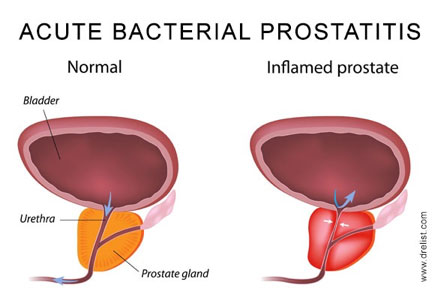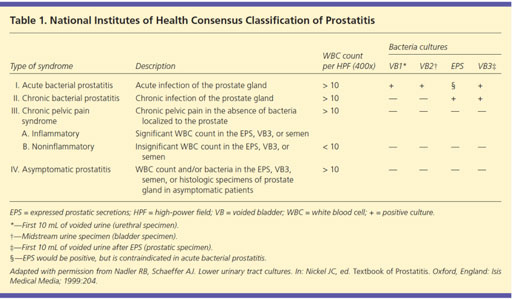The Power of an Antimicrobial Regimen
Natural Cures for Prostatitis
What is the prostate gland and what are its functions?
The prostate is part of the male reproductive system. It is about the size of a walnut; weighs about an ounce; and is below the bladder, in front of the rectum. The prostate goes all the way around a tube called the urethra, which carries urine from the bladder out through the penis. Its function is to store and secrete a clear, slightly alkaline fluid that constitutes 10-30% of the volume of the seminal fluid, that along with the spermatozoa, constitutes semen.
There are four classifications of prostatitis: acute bacterial, chronic bacterial, chronic prostatitis/chronic pelvic pain syndrome, and asymptomatic. Acute bacterial prostatitis is illustrated in Figure 1.

Figure 2, from American Family Physician Volume 82, Number 4 August 15, 2010, denotes the different classifications of prostatitis, including the usual presenting complaints and the evaluation to determine the diagnosis. A digital rectal exam to palpate the prostate gland is required.

The differential diagnosis of prostatitis includes acute cystitis, benign prostatic hyperplasia, urinary tract stones, bladder cancer, prostatic abscess, enterovesical fistula and foreign body within the urinary tract.
The Power of an Antimicrobial Regimen
Commonly used medications include antimicrobials, alpha blockers and anti-inflammatory agents, but the effectiveness of these agents has not been supported in clinical trials. Small studies provide limited support for the use of non-pharmacologic modalities. Asymptomatic prostatitis is an incidental finding in a patient being evaluated for other urologic problems. (Am Fam Physician. 2010;82(4):397-406).
An article published in Dentistry 2015 5:284 titled “Periodontal Treatment Improves Prostate Symptoms and Lowers Serum PSA in Men with High PSA and Chronic Periodontitis,” revealed a relationship between periodontal disease and prostatitis. Here is the abstract of the article.
“Prostatitis is a chronic inflammation of the prostate gland that can compromise a man’s quality of life. Naif Alwithanani, from Case Western Reserve University (Ohio, USA), and colleagues studied 27 men, ages 21 years and older, each of whom were diagnosed with prostatitis within the past year (via biopsy and prostate specific antigen [PSA] test). The men were assessed for symptoms of prostate disease by answering questions on the International-Prostate Symptom Score (IPSS) test. Of the 27 participants, 21 had no or mild inflammation, but 15 had biopsy-confirmed malignancies, and 2 had both inflammation and a malignancy. Each of the subjects had at least 18 teeth, and all of them showed moderate to severe gum disease. They received treatment and were tested again for periodontal disease four to eight weeks later and showed significant improvement. During the periodontal care, the men received no treatment for their prostate conditions. But even without prostate treatment, 21 of the 27 men showed decreased levels of PSA. Those with the highest levels of inflammation benefited the most from the periodontal treatment. Six participants showed no changes. Symptom scores on the IPSS test also showed improvement. The study authors write that: “Periodontal treatment improved prostate symptom score and lowered PSA value in men afflicted with chronic periodontitis.”
A natural way to help with oral health is with Microbiome ENT and if you have symptoms of Melatonin deficiency then take melatonin.
All men with prostatitis should have a complete dental evaluation.
There are numerous websites suggesting natural cures for prostatitis. One example is http://www.natural-homeremedies.com/blog/best-natural-cures-for-prostatitis/.
Natural Cures for Prostatitis
Garlic (Kyolic Garlic)
Garlic (Kyolic Garlic) is a well-known flavoring food that has been used for medicinal purposes including prostatitis. Allicin is a active substance in garlic that helps to cure many health conditions. Garlic has antispasmodic, antibiotic, diuretic and anti-bacterial properties that work on the prostate gland and can significantly improve urinary symptoms. Garlic can be consumed as a whole clove or taken in supplements (Kyolic Garlic) and garlic extracts. Standard dose of whole garlic is 4 grams, three times a day and 1200 milligrams of garlic extract per day.
Saw palmetto is a fruit that is useful in making herbal supplements and is commonly useful to treat conditions of prostatitis. It helps to reduce inflammation by inhibiting production of chemicals such as prostaglandins and leukotrienes. Saw palmetto is easily available in capsule, tablet or tea form. Standard dosage of this herb is 160 milligrams two times a day to alleviate prostatitis symptoms.
Broccoli is a fresh vegetable that has anti-inflammatory property, thereby works as a powerful treatment for prostatitis. Broccoli can be consumed as a vegetable or you can boil it in 1 liter of water for 10 minutes, taking half of this juice in the morning on an empty stomach and other half in the evening. This is a 21-day treatment that includes not eating spicy foods or drinking coffee. This will help to eliminate prostatitis.
Goldenseal
Goldenseal is an excellent herb that has been used to treat numerous ailments, including prostatitis. This herb contains essential nutrients including iron, potassium, manganese, calcium and phosphorous, and has anti-inflammatory, anti-bacterial properties that have proven to shrink prostatitis. Goldenseal is best taken in tea form by dropping 2 teaspoons of goldenseal flower in boiling water for 5 minutes, straining the water and drinking it two times a day for valuable results.
Pumpkin seeds are rich in glycine, amino acids, and glutamic acid that reduces the weight of the prostate gland and decreases many prostate problems, thereby increasing the urinary flow without pain. This is an old remedy that helps to eliminate prostatitis. Phytosterols is an active compound present in pumpkin seeds that is responsible for shrinking the prostate. You can eat about 1 ounce of shelled pumpkin seeds two to three times a week or even sprinkle them over salads and various dishes.
You can also prevent prostatitis by following simple tips like staying hygienic and keeping your penis clean; drinking enough fluids; and eating high fiber fruits such as cereals, fruits, and vegetables.
Low magnesium is associated with an increased risk of prostatitis and prostate cancer.
Helps with the infection and inflammation.
Vitamin C has been shown to stimulate both the production and function of leukocytes (white blood cells), especially neutrophils, lymphocytes and phagocytes.
Several active leads exist regarding the role of micronutrients and metabolites in prostate cancer carcinogenesis and risk. How vitamins D and A may adversely impact risk, and whether low-dose vitamin E supplementation remains a viable preventive approach, require further study.

About the Author
Douglas C. Hall, M.D.
Dr. Douglas Hall, was born in Indianapolis, Indiana on Jan. 30, 1941. He received his BS and Doctor of Medicine at the University of Florida, training in obstetrics and gynecology. Dr. Hall has been in private practice since 1974 and currently has a large practice in Ocala, specializing in OB/GYN and Functional Medicine.

